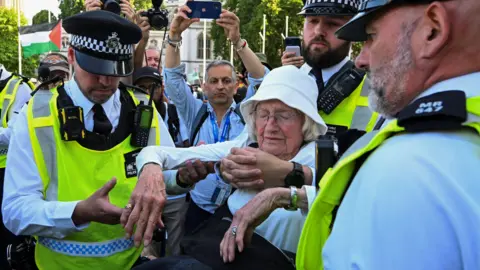The recent arrests of supporters of the group Palestine Action have sparked significant discussions about the implications of the current terrorism laws in the UK. In a move deemed controversial, the Liberal Democrats have called for a comprehensive review of these laws, expressing concerns that their application may impede free speech and stifle public dissent.
Last week, the Metropolitan Police carried out a large-scale operation during a demonstration supporting Palestine Action, leading to the arrest of over 500 individuals. This massive crackdown garnered attention and criticism, as many questioned the necessity and appropriateness of such actions under terrorism legislation. The Home Secretary, Yvette Cooper, has maintained that the decision to classify Palestine Action as a banned group was justified by security assessments, stating that the organization is, in her view, “not a non-violent organisation.”
Amidst the arrests and the ongoing tensions related to protests over the situation in Gaza and the West Bank, the Equality and Human Rights Commission has also weighed in on the matter. The commission conveyed its concerns regarding the policing strategies employed during these demonstrations, particularly emphasizing their worries about the police’s heavy-handed response which may dissuade individuals from exercising their rights to free expression and assembly. Baroness Kishwer Falkner, the chair of the commission, highlighted the precarious balance that must be maintained between public security and the fundamental rights of citizens.
Notably, while the commission expressed apprehension regarding the policing of protests, it clarified that its concerns were not directed at protests linked to any proscribed organization. In this context, the commission’s statements reflect a broader anxiety over the potential risk of a “chilling effect,” which could hinder the public’s willingness to engage in demonstrations for fear of severe repercussions.
The grave implications of the government’s decision to classify Palestine Action as a criminal group have resulted in significant legal ramifications. Membership or support for the group now poses a serious legal risk, with violations potentially leading to lengthy prison sentences of up to 14 years. This stringent approach follows Palestine Action’s radical actions, such as vandalizing aircraft at RAF Brize Norton, which further motivated the government’s decision to ban the group. Now, the case surrounding the ban is set to be reviewed in the High Court this November, where the legality of the classification will be scrutinized.
At a rally supporting Palestine Action in central London, demonstrators echoed sentiments of solidarity, with signs proclaiming “I oppose genocide. I support Palestine Action.” However, these demonstrations resulted in significant police intervention, marking one of the largest single-day arrests in a decade, as noted by the Metropolitan Police.
Lisa Smart, the Liberal Democrats’ spokesperson on home affairs, articulated the party’s concerns regarding the use of terrorism laws against peaceful protestors. While acknowledging the seriousness of Palestine Action’s activities, she insisted that peaceful demonstrators exercising their rights should not be subjected to the stringent measures designated for terrorist actions. She contended that existing laws already address expressions of violence or hate speech, such as those found in the Public Order Act, and cautioned that deploying the Terrorism Act in this context creates dangerous precedents.
Smart has formally requested a review from Jonathan Hall KC, the independent reviewer of terrorism legislation, urging him to consider whether the current laws require revision to prevent potential misuse in future scenarios. Hall operates autonomously from the government and possesses substantial access to classified security information, making his insights particularly valuable in this reviewing process.
In addressing the widespread arrests, Home Secretary Yvette Cooper reiterated her stance that Palestine Action has been involved in violent acts and has caused significant damage to national security infrastructure. She suggested that some individuals opposing the group’s proscription may not fully understand the organization’s nature, especially due to restrictions on reporting related to ongoing serious prosecutions.
The intersection of protest rights, terrorism legislation, and public safety is increasingly complex in today’s political landscape. The ongoing dialogues surrounding the Palestine Action arrests underscore the critical need for a careful assessment of the legislation governing protests to ensure that the rights of citizens are protected while maintaining public security. As the situation develops, it is imperative for government officials and advocacy groups to engage in meaningful discussions aimed at fostering a just equilibrium between these often conflicting interests.











